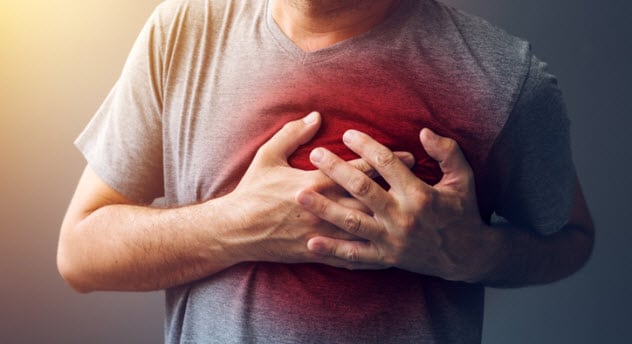 Crime
Crime  Crime
Crime  Technology
Technology 10 Hilariously Over-Engineered Solutions to Simple Problems
 Miscellaneous
Miscellaneous 10 Ironic News Stories Straight out of an Alanis Morissette Song
 Politics
Politics 10 Lesser-Known Far-Right Groups of the 21st Century
 History
History Ten Revealing Facts about Daily Domestic Life in the Old West
 Weird Stuff
Weird Stuff 10 Everyday Products Surprisingly Made by Inmates
 Movies and TV
Movies and TV 10 Actors Dragged out of Retirement for One Key Role
 Creepy
Creepy 10 Lesser-Known Shapeshifter Legends from Around the World
 Animals
Animals 10 Amazing Animal Tales from the Ancient World
 Gaming
Gaming 10 Game Characters Everyone Hated Playing
 Crime
Crime 10 Terrifying Serial Killers from Centuries Ago
 Technology
Technology 10 Hilariously Over-Engineered Solutions to Simple Problems
 Miscellaneous
Miscellaneous 10 Ironic News Stories Straight out of an Alanis Morissette Song
Who's Behind Listverse?

Jamie Frater
Head Editor
Jamie founded Listverse due to an insatiable desire to share fascinating, obscure, and bizarre facts. He has been a guest speaker on numerous national radio and television stations and is a five time published author.
More About Us Politics
Politics 10 Lesser-Known Far-Right Groups of the 21st Century
 History
History Ten Revealing Facts about Daily Domestic Life in the Old West
 Weird Stuff
Weird Stuff 10 Everyday Products Surprisingly Made by Inmates
 Movies and TV
Movies and TV 10 Actors Dragged out of Retirement for One Key Role
 Creepy
Creepy 10 Lesser-Known Shapeshifter Legends from Around the World
 Animals
Animals 10 Amazing Animal Tales from the Ancient World
 Gaming
Gaming 10 Game Characters Everyone Hated Playing
Top 10 Things You Won’t Believe Are Contagious
Certain viruses, bacteria and parasites get all the attention for being contagious. If a friend happens to pick up Covid-19, ringworm or lice, we’re probably going to give them a little extra space for a while. Despite the many diseases we know spread from one person to another, there are still plenty we are not even aware of. On top of that, you can catch things from other people that Clorox wipes and hand sanitizer are powerless against. Laughing and yawning are well-known to travel from one person to another.
Between sneaky bacteria and behaviors we believed were under our own control, there are numerous infections we are all spreading amongst ourselves. Read on to discover 10 things you probably didn’t know you could catch from someone else.
Top 10 Health Disorders Made Up To Sell Products
10 Heart Disease

Heart disease has long been considered a noncommunicable disease, a result of genetics and lifestyle choices. Earlier this year, a team of fellows in CIFAR’s Humans and Microbiome program provided evidence to the contrary. They found that heart disease, as well as other diseases such as IBS and type 2 diabetes, can also be contagious.
The team began with the basis that all these diseases coexist with an altered microbiome, the mix of bacteria, fungi, and parasites that exist in our gut. When these altered microbiomes are installed in animal models, they create disease in their new host. The unhealthy microbiome that causes these diseases is what spreads from person to person similar to how a stomach bug does.
Whether or not a healthy microbiome can be passed from one person to another is still being researched.[1]
9 Loneliness

Ironically, loneliness is contagious. While it might seem like a group of lonely people would have something in common and therefore not be so lonely, it doesn’t actually work that way. A long-term study of over 5,000 people and their social relationships showed a traceable spread of loneliness from one person to another.
People begin experiencing feelings of loneliness before they become entirely isolated. This means people start feeling lonely when they are still spending time with friends, which is how they share their feelings of loneliness with others before adopting a hermit lifestyle. Those transferred feelings of loneliness take root in the next person, and the cycle continues.
We’re more susceptible to catching loneliness from friends than from family, and women tend to be more affected than men.[2]
8 Ulcers

Stressful lifestyles and spicy foods have often been wrongly accused of causing peptic ulcers. In reality, the main cause of stomach ulcers is a bacterium called Helicobacter pylori.
More than half of the world’s population is infected with the bacterium. For reasons not yet understood, some people never suffer any symptoms of H. pylori, while others develop peptic ulcers in the stomach and small intestine because of it. The ulcer-causing bacterium is contagious through saliva and fecal matter, so swapping spit and poor handwashing practices could land you an ulcer.[3]
7 Feeling Cold

Researchers at the University of Sussex discovered evidence that human beings are susceptible to temperature contagion, a phenomenon where simply viewing someone in a cold situation causes our own body temperature to drop. Participants in a study were asked to watch a video someone plunging their hand into ice water. Not only did the viewers express that the video made them feel cold, the actual surface temperature of their hands decreased significantly.
Interestingly, temperature contagion was only associated with feeling cold. When watching someone put their hand into warm water, participants had little to no physical response.[4]
6 Happiness

We all know from experience that being around happy people makes us feel pretty cheerful, while Pessimistic Peters have the ability to turn winning the lottery into a bad day. It turns out that our happiness is affected by more than just our inner circles of friends and family.
You might not have chosen your home based on the disposition of those living in the area, but they have a pretty big influence on your mood. If you happen to have a cheerful sibling living nearby, they’ll increase your odds of happiness by 14%. A happy next-door neighbor increases your odds by 34%, while a happy friend living down the road ups your odds by more than 40%.[5]
Top 10 Reasons School Can Be Harmful For Mental Health
5 Cancer

There are three animals that currently suffer from transmissible forms of cancer.
Tasmanian devils spread facial tumors through bites, dogs transmit venereal tumors through sexual contact, and soft-shelled clams spread their infected cancerous cells through seawater. These findings over the last few decades have drastically changed our knowledge of cancer’s ability to become a contagious disease.
While humans are not yet known to easily transmit cancerous cells from one host to another, there have been documented cases where certain circumstances allowed just that to happen. In 2018, an organ donor died with undiagnosed breast cancer. Four people received transplants of her organs, and all four of them developed breast cancer. In another case, an HIV-positive patient contracted cancer from a tapeworm in his intestines. In all of these examples, the patients who caught cancer from another host had compromised immune systems. Scientists currently believe that contagious cancer is highly unlikely to occur in humans outside of these unusual situations, though the development of transmissible cancer in animals shows how that can change.[6]
4 Bad Behavior

Most of us are already familiar with how being in a group of people who are breaking the rules can influence us to do the same, even if we wouldn’t have done so under normal circumstances. But research conducted in a series of experiments in the Netherlands proves that this link extends beyond just that particular moment. Not only are we more likely to break rules when surrounded by other rule breakers, we’re also going to be more likely to break other rules in other situations.
If we’re walking down the road with a bunch of litterbugs, we might toss our own trash to the curb. But later when we’re alone, that exposure to the breaking of social norms can cause us to be more likely to pilfer someone else’s snacks out of the breakroom at work or fail to clean up after our dog during their walk.[7]
3 High Blood Pressure

High blood pressure, often associated with unhealthy diet and lifestyle choices, was discovered to also be linked to a very common contagious virus.
A team of researchers discovered that mice infected with cytomegalovirus, or CMV, developed higher blood pressure than those without the virus. That’s not to say diet doesn’t play a role—mice infected with CMV who also binged on high-cholesterol foods had the highest blood pressure rates. The researchers also conducted trials with human cell cultures. The human cells infected with CMV created a protein already known to contribute to high blood pressure.
CMV is estimated to affect between 60 and 99% of adult humans worldwide. The virus is transmitted through the sharing of bodily fluids and stays in your body for life.[8]
2 Goals

Due to something called goal contagion we unintentionally, and often subconsciously, adopt the inferred goals of people we interact with. If someone we’re chatting with at a dinner party is trying to relax and enjoy themselves, they don’t need to spell that out for us. We’ll pick that up from their behavior, body language, and topics of conversation. If this goal is deemed appropriate, there’s a good chance we’ll adopt it ourselves and go about having our own good time. If instead we’re interacting with someone who arrived making excuses about having to leave early, we too might find ourselves checking our watch and trying to make a swift exit.
Goal contagion is stronger with someone in your inner circle than a stranger, and it is less likely to occur when the goal is seen as inappropriate. So if our dinner party pal is going around slipping roofies in people’s drinks, we won’t be subconsciously compelled to do the same.[9]
1 Cavities

Of all the things your dentist usually recommends to keep your teeth healthy – flossing, brushing, cutting back on sugar – avoiding people with poor dental hygiene probably isn’t on that list.
Cavities occur when bacteria in our mouth converts sugar into acid that adheres to the tooth and eats away at the enamel. Even if you brush and floss regularly, kissing someone with lazy oral hygiene habits will land you with the same cavity-causing bacteria in your own mouth.
Children are more susceptible because they haven’t yet built up any immunity to the bacteria. An adult can pass cavity-causing bacteria to their child by kissing them on the mouth, sharing utensils, or cleaning off a pacifier with their mouth before returning it to a baby.[10]
10 Ridiculous Health Myths (Science Says Are Actually True)








